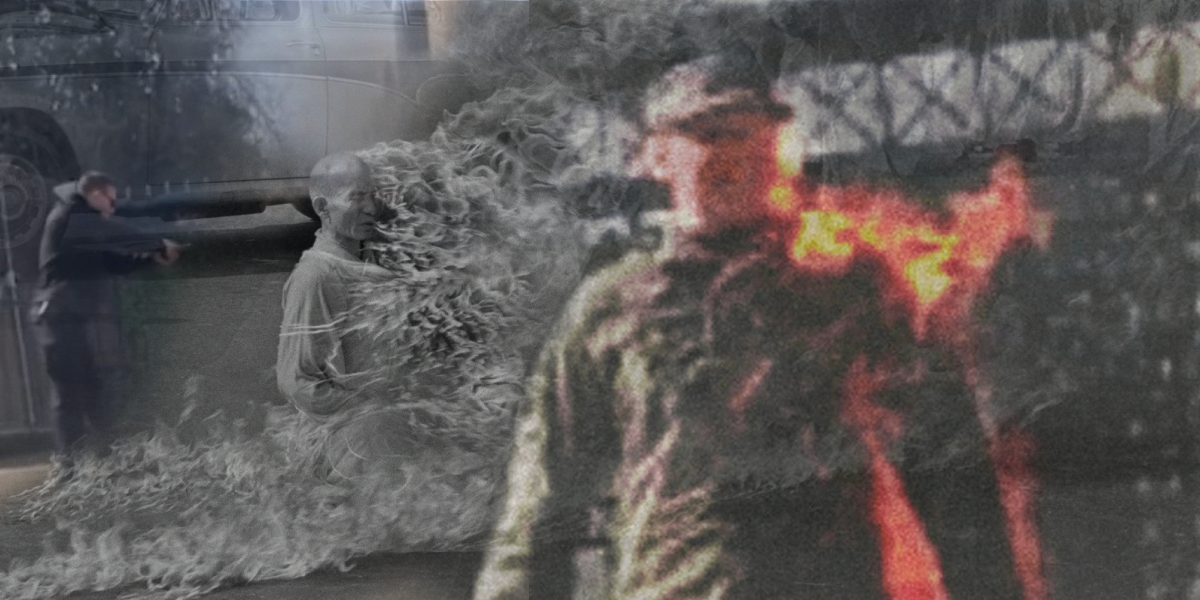On June 11, 1963, Buddhist monk Thich Quang Duc, contemplating an upturned moral order, self-immolated at a crowded intersection in then-occupied Saigon. He is seated in the lotus position, remaining still as fire engulfs and overtakes him. Brother monks surround the area and throw themselves under police boots and batons to prevent them from breaking up the protest.
Quang Duc’s immolation—his stillness and silence—inflamed persecuted Buddhists and Vietnamese targeted by the occupation government, its French and later American backers. That year, others would publicly self-immolate. In footage, onlookers prostrate themselves before the burning monks.
The day before his protest, Quang Duc’s comrades tipped off American photographer Malcolm Browne to be at the square. Aaron Bushnell chose to broadcast himself.
My name is Aaron Bushnell. I am an active duty member of the US Air Force, and I will no longer be complicit in genocide. I am about to engage in an extreme act of protest, but compared to what people in Palestine have been experiencing at the hands of their colonizers, it’s not extreme at all. This is what our ruling class has decided will be normal.
He is in uniform. In one hand is his phone, in the other a large travel mug. He sets down the phone facing the Israeli Embassy in Washington DC. He steps into frame and empties the large mug onto his head. He stands at attention, dons his hat and produces a lighter.
He flicks the lighter but it goes out, he flicks it again several more times, struggling to draw a flame. Did that take him out of what he was doing? Had the act of destruction—even momentarily—become a series of tasks, a job he’d consigned himself to? A guard calls out, can I help you, sir, a warning. Can I help you, meaning ‘stop.’ He flicks the lighter. It works.
Doused in fuel, his body is immediately engulfed in flames. Out of frame, sirens are heard. Guards aim guns at the burning man, yelling get on the ground. Bushnell remains upright, fists clenched, demanding “free Palestine” as the fire consumes him.
Of Quang Duc’s immolation, psychotherapist and pilgrimage guide Edward Tick writes “It was an extreme act in the Buddhist tradition of taking all suffering upon oneself to protest the suffering of others.” Witnessing his stillness, one cannot avoid the nationalism of Quang Duc and the monks: unyielding in the face of repression, immovable even by fire.
How can we view Aaron Bushnell’s immolation? First, we must acknowledge he is not the first US armed forces member to self-immolate in protest of Washington’s role in the genocide of Palestinians. Last December, an unidentified woman believed to be a former service member self-immolated in front of the Israeli Consulate in Atlanta. The protest was not filmed, security footage has not been released, and neither the condition nor identity of the woman have been disclosed. The story received almost no media attention.
Aaron Bushnell, speaking clearly and in uniform via livestream, is a moral whistleblower. America’s abetting genocide is no secret; however, Bushnell has revealed and embodied US policy and inhumanity to the fullest and most vital extent. Bushnell shows us exactly what Washington has done to more than 70,000 mostly women and children maimed or murdered by indiscriminate aerial bombardment. He did so at the seat of power, in view of the occupation regime’s American representatives. We are left with his final words, the demands he died for, a physical and soul imperative: free Palestine.

Leave a Reply